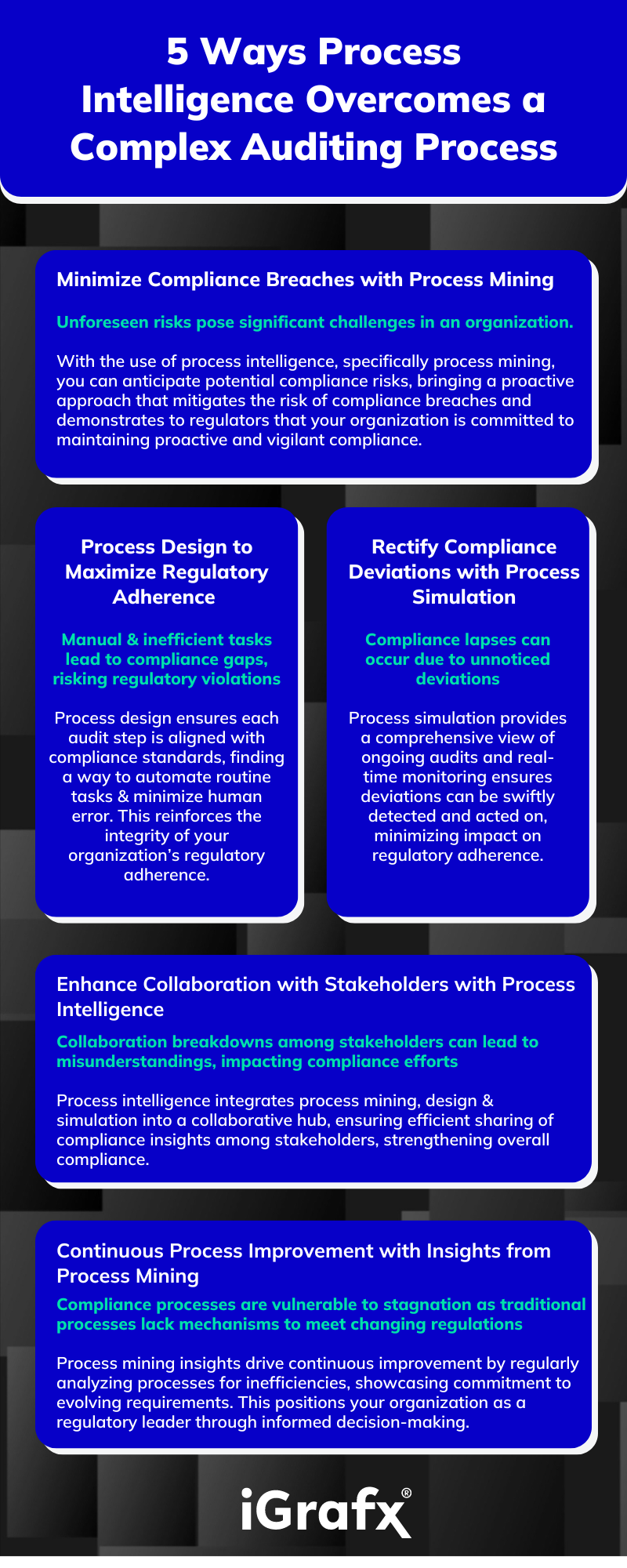By James Berrocales
In the realm of corporate compliance, the intricacy of audit processes gives rise to a host of challenges. Organizations find themselves entangled in prolonged procedures, strained resources, and the persistent risk of overlooking crucial aspects.
Cumbersome processes not only strain resources but also create inefficiencies that go beyond just meeting compliance requirements. In the face of these challenges, the looming threat of oversight emerges, putting organizations at risk of regulatory pitfalls and operational disruptions.
This blog explores 5 key challenges linked to complex audits, and how process intelligence acts as a solution to streamlining audits.
Minimize Compliance Breaches with Process Mining
Problem: Risk assessment is a critical aspect of compliance, and unforeseen risks can pose significant challenges. Traditional methods may fall short in providing the foresight needed to identify and address potential compliance risks proactively.
Solution: Integrating predictive analytics with process mining equips you with a powerful tool for risk management. By understanding historical processes through process mining, predictive analytics enables the anticipation of potential compliance risks. This proactive approach ensures that compliance efforts are not only reactive but also strategic and forward-thinking.
Benefits of using process intelligence: Enhancing risk assessment through process intelligence mitigates the risk of compliance breaches. Predictive analytics allows you to stay ahead of potential issues, demonstrating to regulators and stakeholders that your organization is committed to maintaining proactive and vigilant compliance.
Process Design to Maximize Regulatory Adherence
Problem: As a compliance manager, you’re familiar with the challenges of ensuring that audit processes align precisely with regulatory requirements. Manual and inefficient tasks can lead to compliance gaps, risking regulatory violations and potential legal consequences.
Solution: Process intelligence, coupled with process design, not only expedites audit processes but ensures that each step is meticulously aligned with compliance standards. By finding ways to automate routine tasks, the risk of human error is significantly reduced, providing a more robust defence against compliance-related issues.
Benefits of using process intelligence: Implementing process design within automated workflows not only streamlines audits but also fortifies your compliance framework. This approach ensures that audits are conducted with precision, minimizing the risk of non-compliance and reinforcing the integrity of your organization’s regulatory adherence.
Reduce the Time Taken to Identify and Rectify Compliance Deviations with Process Simulation
Problem: Compliance lapses can occur when deviations from standard procedures go unnoticed for extended periods. As a compliance manager, you understand the critical need for real-time insights to prevent and address compliance issues promptly.
Solution: Process intelligence, enhanced by real-time monitoring and process simulation, provides you with a comprehensive view of ongoing audits. The combination of simulated scenarios and real-time monitoring ensures that any deviations can be detected. This empowers you to respond swiftly to potential compliance issues, minimizing the impact on regulatory adherence.
Benefits of using process intelligence: The real-time monitoring feature of process intelligence significantly reduces the time it takes to identify and rectify compliance deviations. This not only strengthens your organization’s compliance posture but also demonstrates a commitment to regulatory diligence and responsiveness.
Enhance Collaboration with Stakeholders with Process Intelligence
Problem: Collaboration breakdowns among stakeholders can lead to misunderstandings, impacting compliance efforts. As a compliance manager, you know that effective communication is paramount to ensuring everyone is aligned with compliance goals.
Solution: Process intelligence offers a centralized hub that integrates insights from various sources such as process mining, process design, and simulation. This becomes a collaborative platform, fostering improved communication and understanding among stakeholders. By providing real-time access to relevant information, a process intelligence platform, such as Process360 Live ensures that compliance-related insights are shared efficiently, facilitating a united front in compliance efforts.
Benefits of using process intelligence: Improved collaboration ensures that compliance requirements are understood and executed consistently across all stakeholders. The process intelligence hub becomes a command center for compliance, fostering a collaborative culture that strengthens the overall compliance framework. This is a further benefit of process intelligence for streamlining audits.
Continuous Process Improvement with Insights from Process Mining
Problem: As a compliance manager, you recognize the importance of evolving compliance processes to meet changing regulations and industry standards. Traditional methods often lack a mechanism for continuous improvement, leaving compliance processes vulnerable to stagnation.
Solution: Process intelligence, specifically insights from process mining, supports a culture of continuous improvement in compliance. Regular analysis of compliance processes allows for the identification of bottlenecks and inefficiencies. Process mining provides the granular insights needed to make data-driven decisions, ensuring that compliance efforts are not only maintained but continuously optimized.
Benefits: Embracing continuous improvement through process intelligence demonstrates to regulators and stakeholders that your organization is committed to staying ahead of evolving compliance requirements. Insights from process mining empower you to make informed decisions, strengthening the compliance framework and positioning your organization as a leader in regulatory adherence.
Navigating Complexity for a Resilient Future
In summary, implementing process intelligence directly addresses the concerns and priorities of risk and compliance teams. By streamlining audits through automated workflows, predictive analytics, real-time monitoring, and continuous improvement, compliance efforts become more robust, proactive, and aligned with regulatory expectations. The benefits extend beyond efficiency, contributing to a culture of compliance excellence within your organization.
Interested in learning more about how iGrafx can help you streamline your organization’s audits? Try a free demo of our Process360 Live platform to enable seamless process optimization with process mining, process design, analysis, simulation, and process automation.


